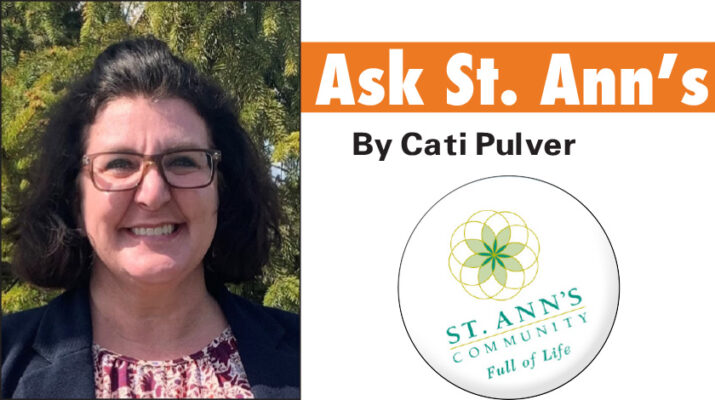How planning today supports the care of tomorrow
By Cati Pulver
 August is National Make-A-Will Month, a time to reflect on the legacy we leave behind and the peace of mind that comes from knowing our wishes will be honored.
August is National Make-A-Will Month, a time to reflect on the legacy we leave behind and the peace of mind that comes from knowing our wishes will be honored.
At St. Ann’s Community, we understand the importance of planning. Each day, we work closely with families navigating decisions about elder care, and those who have prepared in advance often find greater clarity and reassurance throughout the process.
Creating a will is not merely a financial decision. It is an act of care — one that protects loved ones, preserves personal values and ensures that future choices are honored according to one’s wishes.
The Growing Reality of Long-Term Care
As America’s population ages, the need for elder care is rapidly increasing. More than 61 million Americans are currently over the age of 65 — a number projected to reach nearly 84 million by 2050.
In Monroe County alone, over 192,000 residents are aged 60 or older, comprising 25% of the local population. With this shift comes a rising demand for services ranging from independent living to skilled nursing and memory care.
It is estimated that 70% of individuals turning 65 today will require some form of long-term care. While many families plan financially, few are fully prepared for the emotional and logistical challenges that can arise. Having a clear plan in place not only helps manage costs but also ensures smoother, more compassionate transitions for everyone involved.
Why a Will Matters
Despite its critical importance, more than half of Americans do not have a will. Without one, state courts determine how assets are distributed, who becomes responsible for dependents and how healthcare decisions may be made. These outcomes may not reflect an individual’s preferences.
A will serves as a legal and personal declaration. It enables individuals to designate beneficiaries, assign guardianship for children or pets, and support causes and organizations that align with their values. Estate planning is not limited to the wealthy — it is a vital step for anyone who wishes to ensure their intentions are respected.
How to Get Started: Four Simple Steps
1. Take Inventory
Begin by listing your assets, including real estate, savings and investment accounts, insurance policies, personal belongings, and items of sentimental value.
2. Identify Key People
Determine who will receive your assets and who will serve in important roles, such as executor of the estate or guardian for any dependents.
3. Consult a Professional
An estate planning attorney can draft a legally binding will tailored to your needs. In simpler cases, reputable online platforms may offer accessible alternatives for creating a basic will.
4. Store and Review Your Will
Keep your will in a secure location and ensure a trusted individual knows where to find it. Periodically review the document, especially after major life changes such as marriage, divorce, or the birth of a child.
• A Legacy of Care
National Make-A-Will Month offers an opportunity to take a meaningful step toward peace of mind. By creating or updating a will, individuals not only protect their families but also leave behind a legacy that reflects their priorities and values.
Planning today is one of the most powerful ways to shape the care of tomorrow.
 Cati Pulver is director of development for the St. Ann’s Foundation. She can be reached at 585-697-6320, or by email at CPulver@mystanns.com.
Cati Pulver is director of development for the St. Ann’s Foundation. She can be reached at 585-697-6320, or by email at CPulver@mystanns.com.

